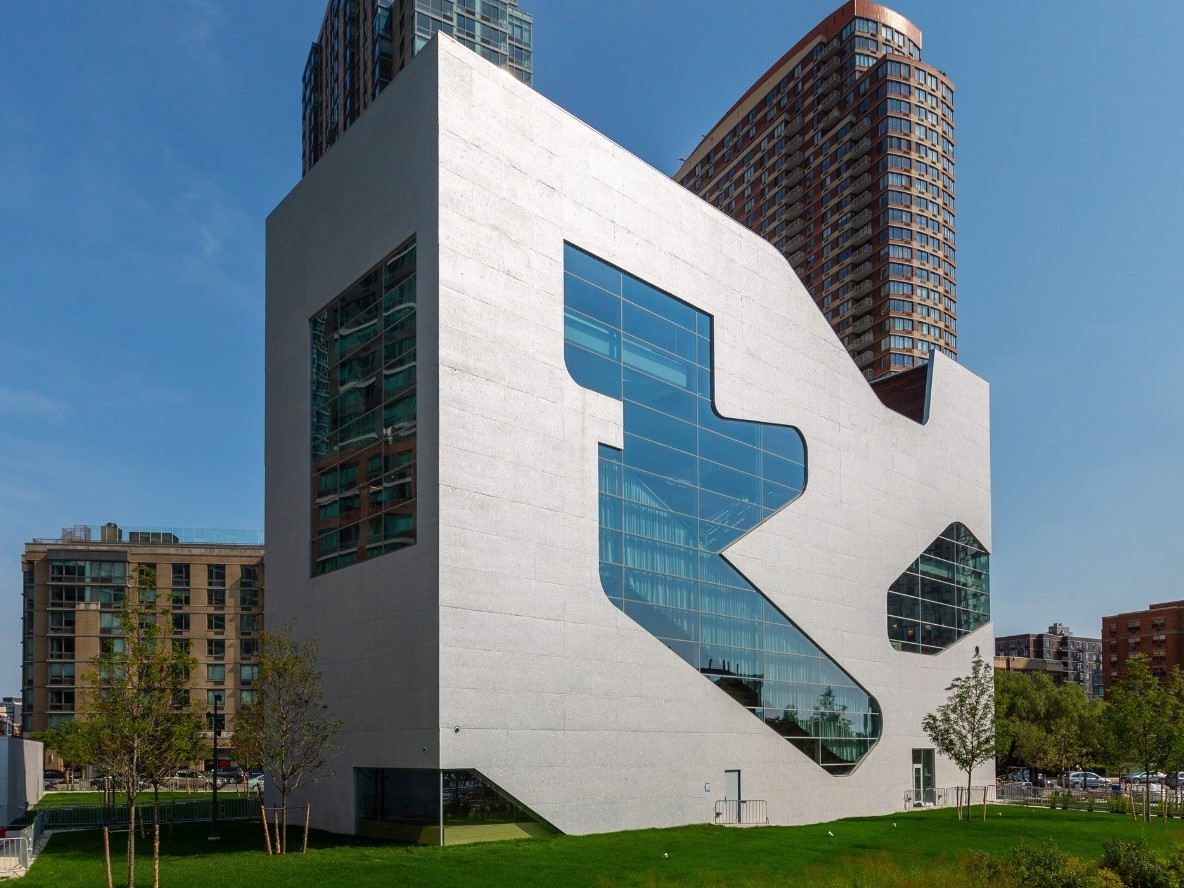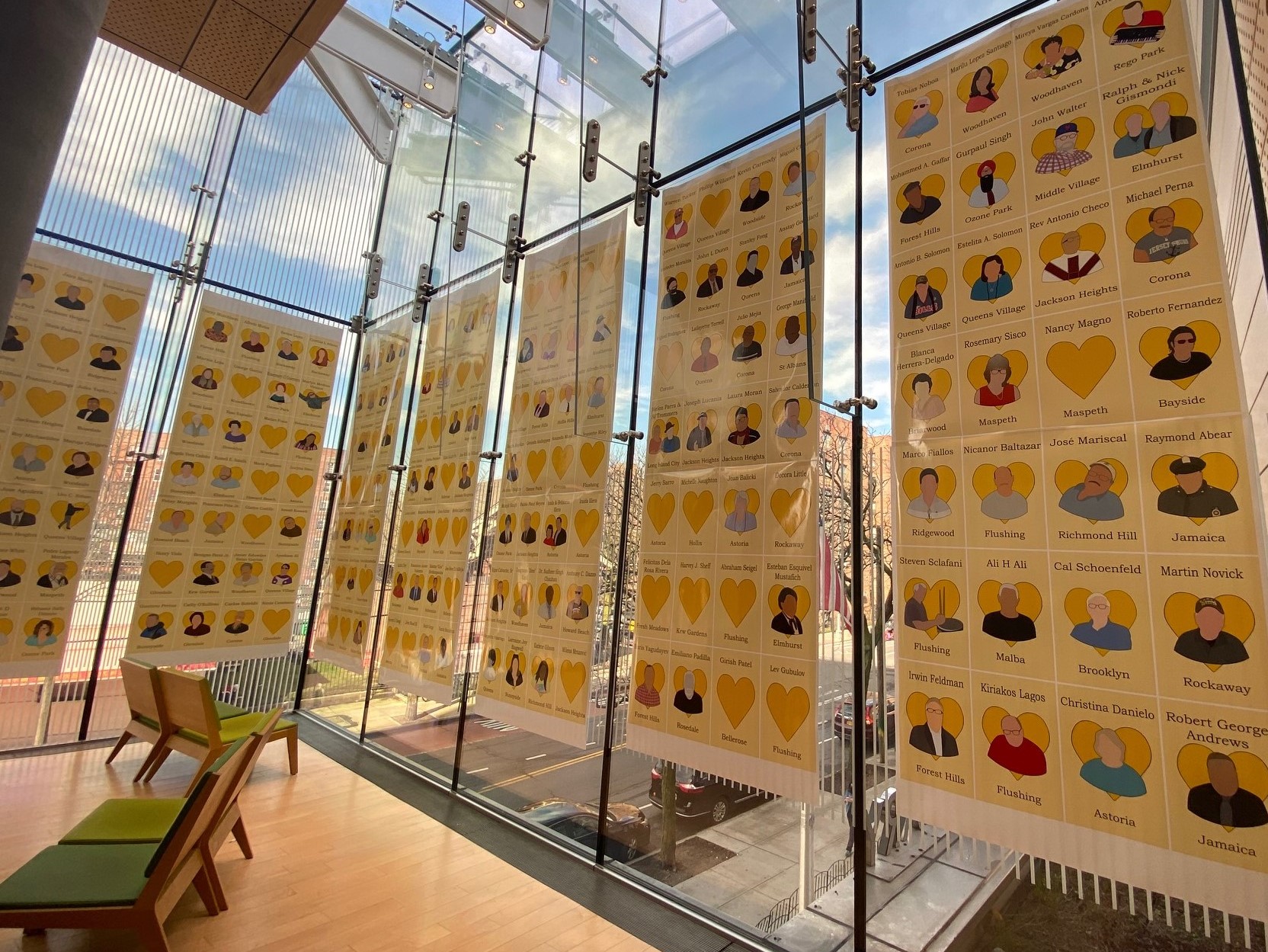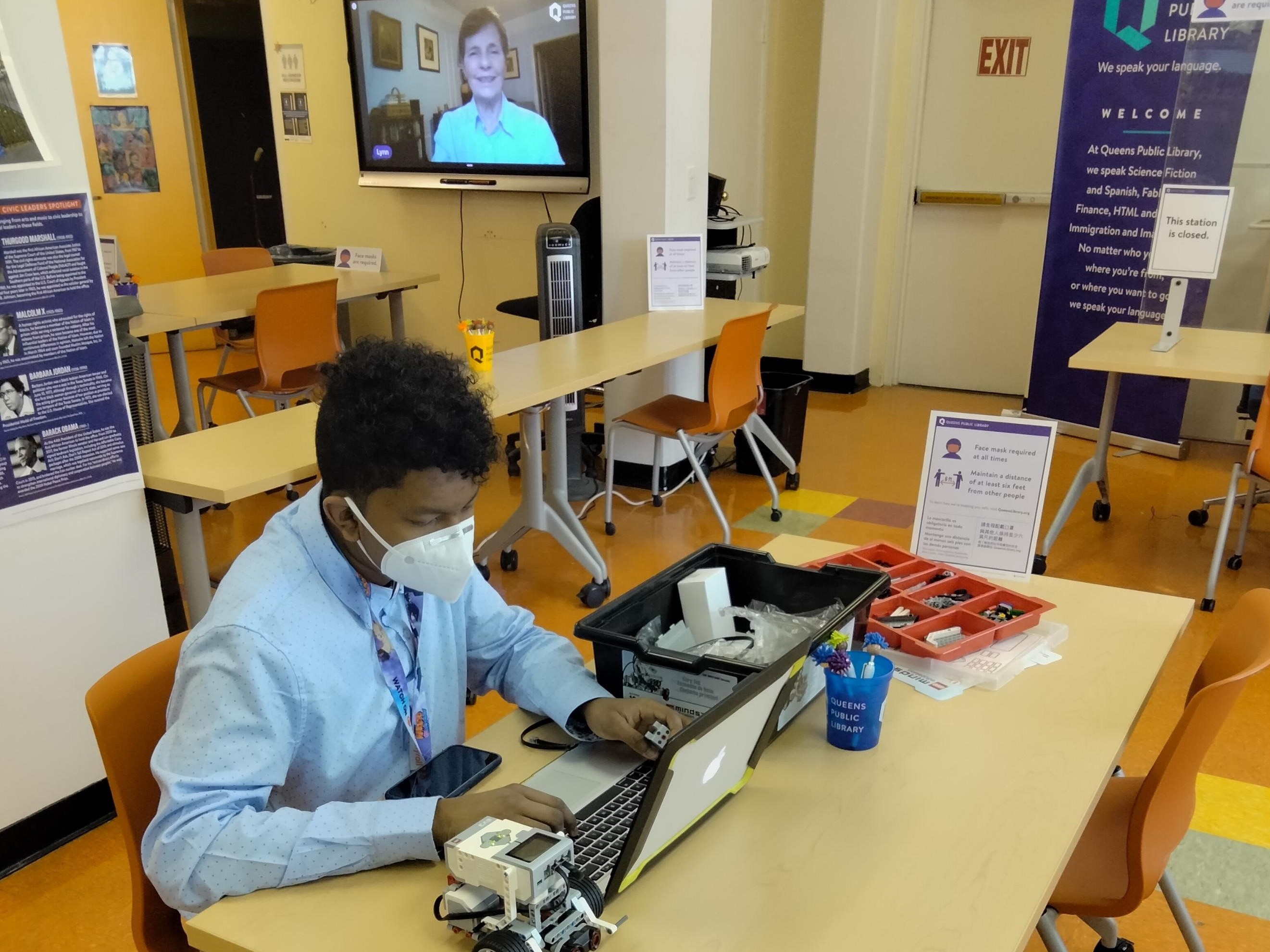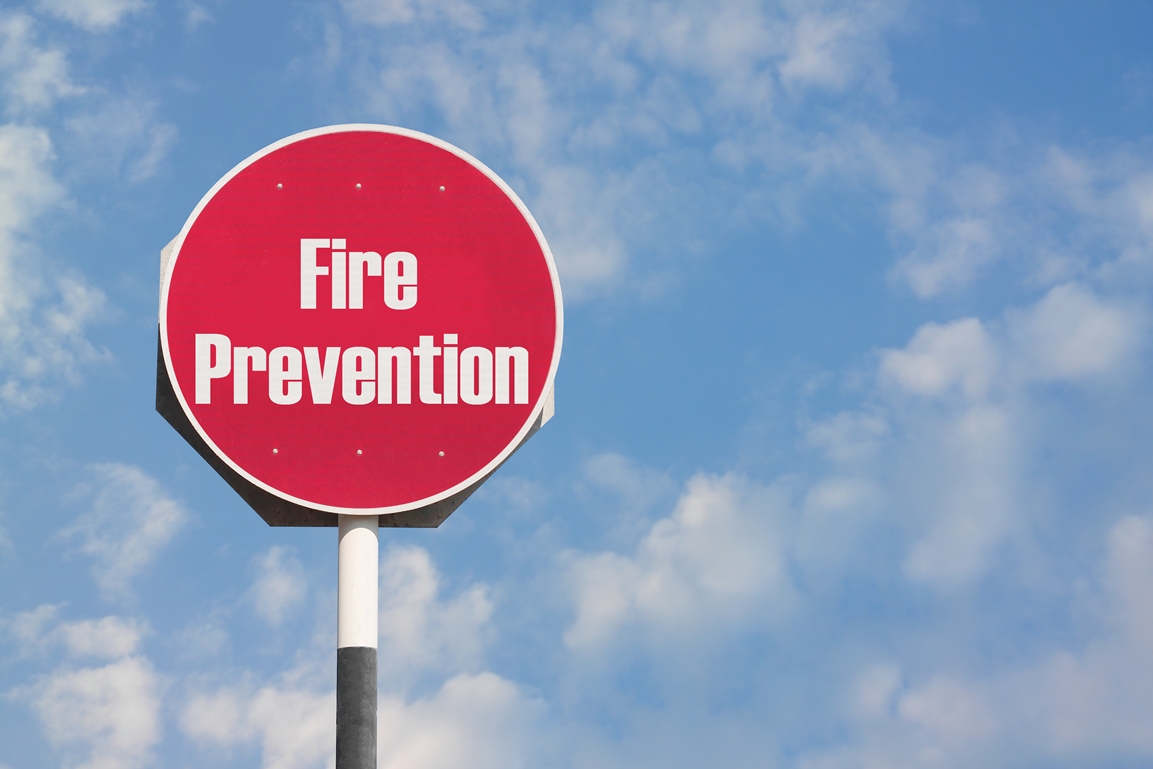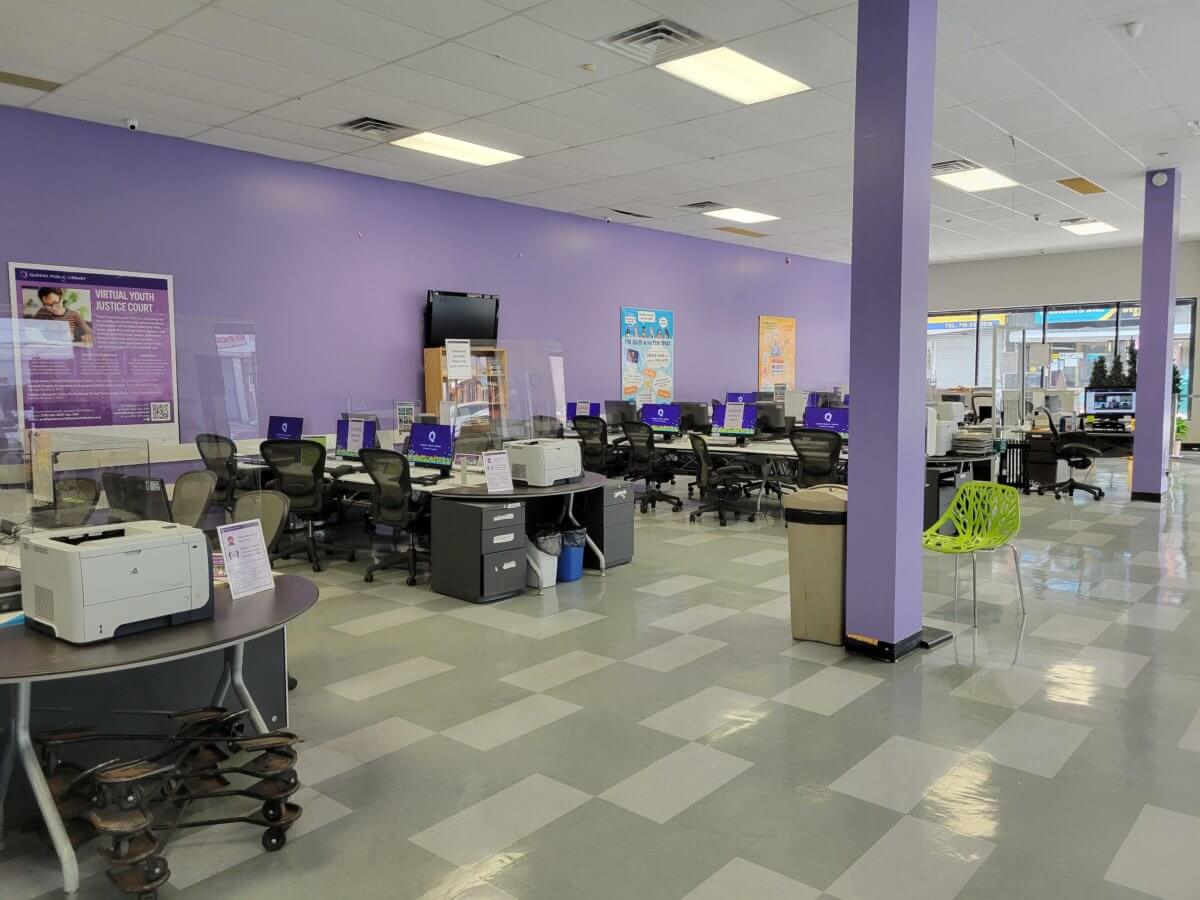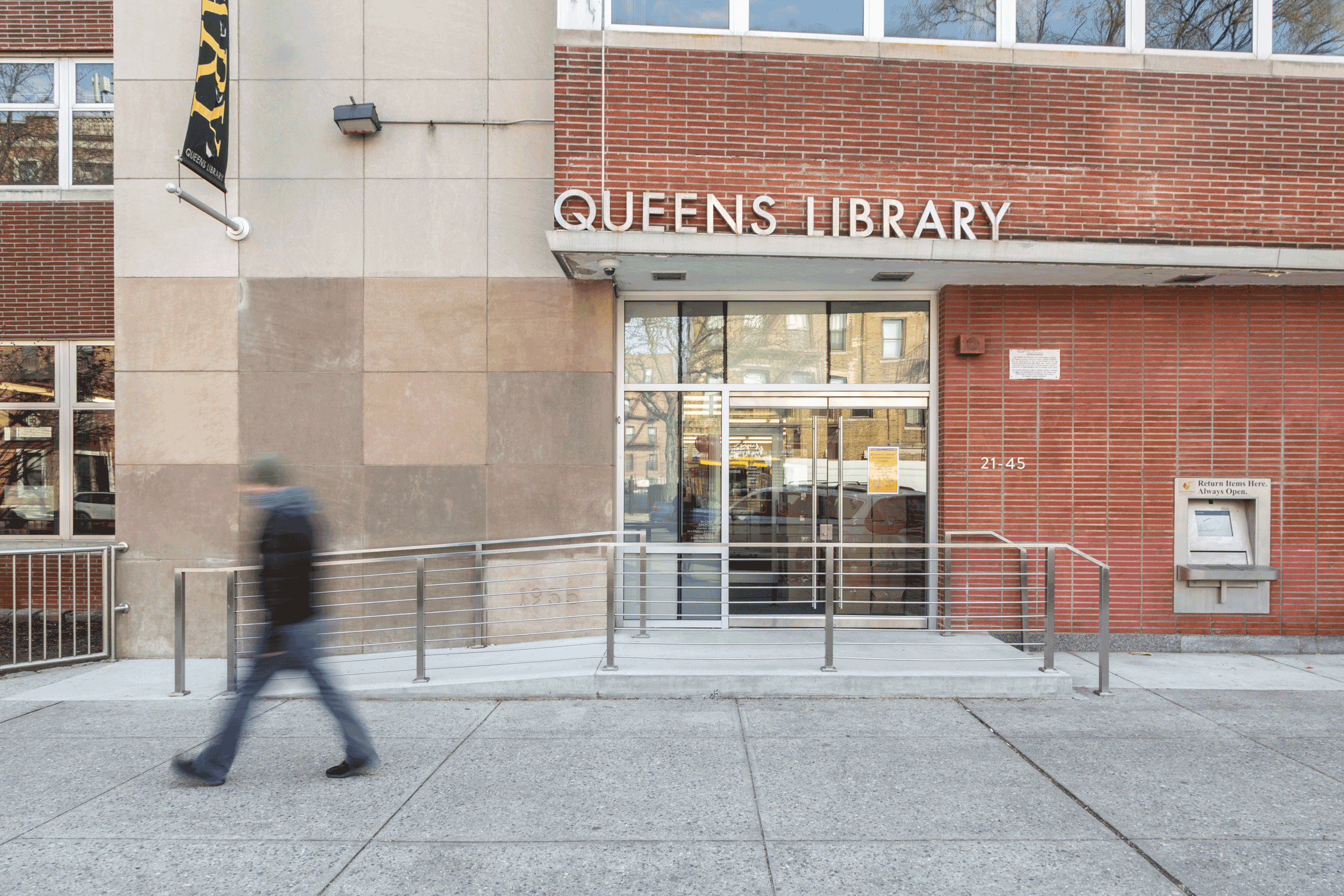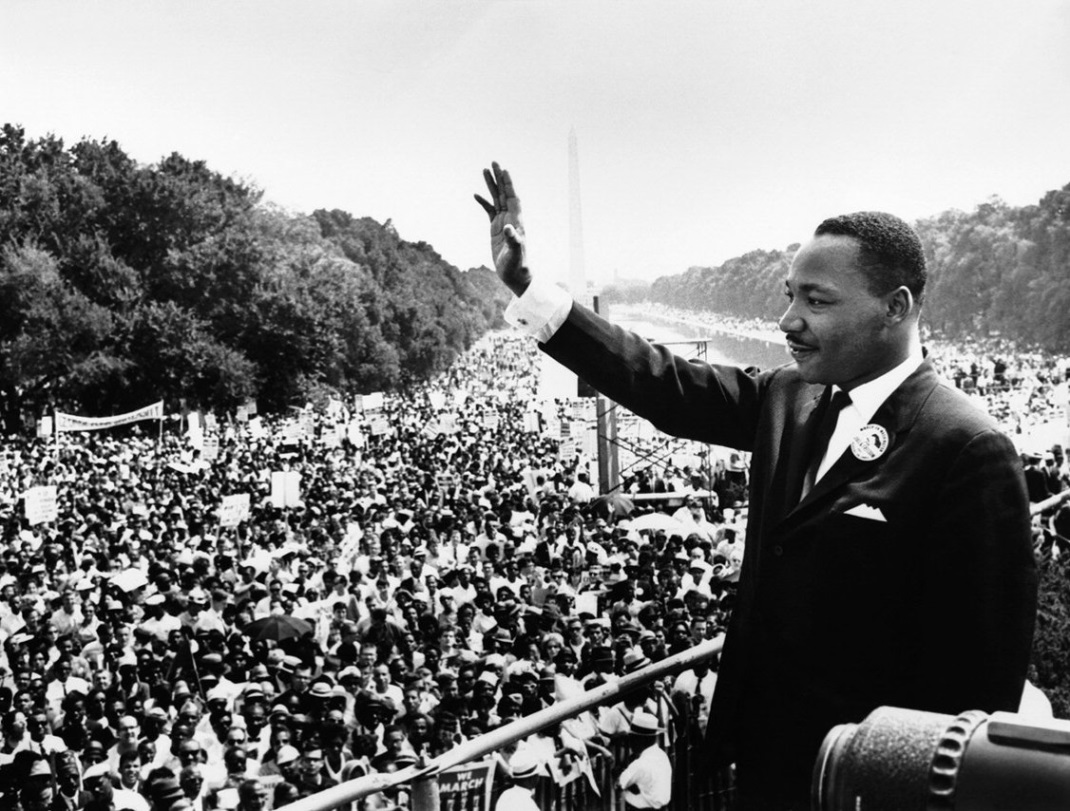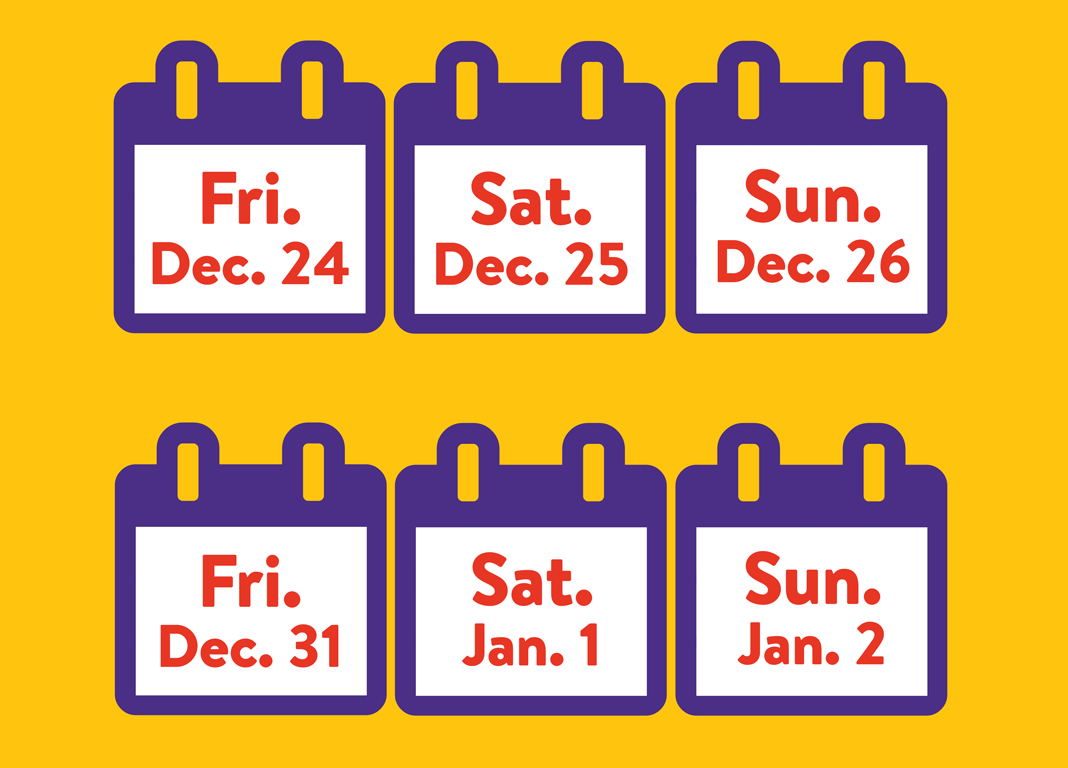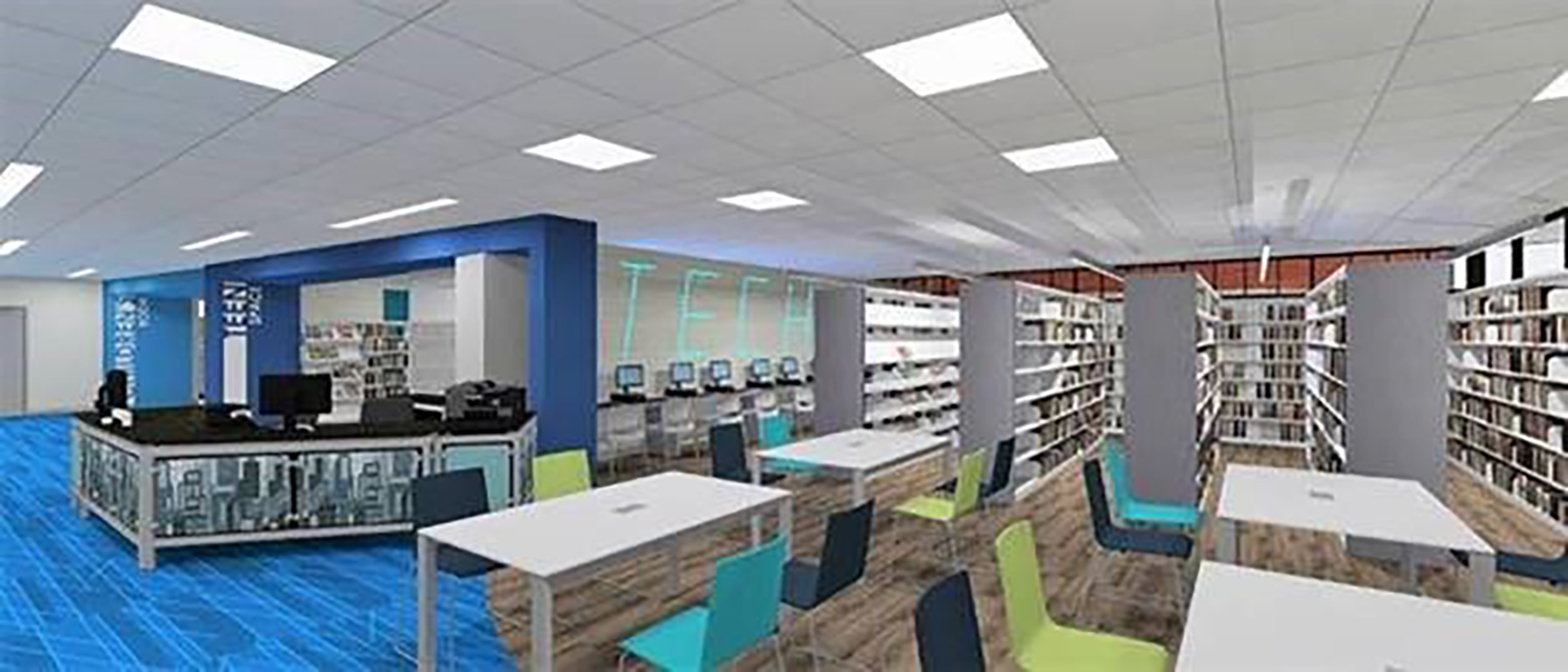“We are AI” series by NYU Tandon Center for Responsible AI and Queens Public Library helps citizen take control of tech
The Center for responsible AI at NYU Tandon, in partnership with Queens Public Library and P2PU, to launch an in-person five-week course “We are AI”, to give citizens a primer on AI and empower them to advocate for policies that prevent its abuses.
QUEENS, New York, March 14, 2022 – We Are AI is a five-week course run as a learning circle by Peer-to-Peer University (P2PU). The goal of the course, which kicks off on March 24, 2022 is to introduce the general public to the basics of artificial intelligence (AI), discuss some of the social and ethical dimensions of its use in modern life, and empower individuals to engage with how AI is used and governed. No math, programming skills, or existing understanding of AI are required!
The in-person We Are AI program is offered by the Center for Responsible AI (R/AI) in partnership with Queens Public Library. It will be led by Julia Stoyanovich, professor of computer science and engineering at the NYU Tandon School of Engineering, professor of data science at the NYU Center for Data Science, and director of NYU R/AI; and Eric Corbett, a Smart Cities postdoctoral research associate at Tandon’s Center for Urban Science and Progress (NYU CUSP).
AI systems, whose decision making processes are invisible to the public, increasingly determine what we read, what we buy, the entertainment we are offered, where we work, what kinds of medical care we receive and more. For citizens to have any meaningful influence over how AI is used as a social tool, they must have some familiarity with how these technologies work, their flaws, and where they are deployed.
“Artificial intelligence is used to make high-stakes decisions that affect all of us,” said Stoyanovich. “But too few citizens are aware of the influence of AI in their lives — in fact many are not even aware of the existence of these systems. We partnered with Queens Public Library and P2PU to help citizens get informed, empowered and active in shaping the laws that can determine how these frameworks are used, and also to help us learn how to get even better at teaching these critical subjects.”
Those interested in participating are encouraged to sign up here.
Embedded within the five modules (What is AI, Learning from Data, Who Lives Who Dies Who Decides, All About That Bias, and We Are AI) are a series of 10-minute videos exploring such topics as defining AI, learning from data, ethics in AI, and bias in AI. There is also an innovative, engaging comic book series designed to make this highly complex matter comprehensible to virtually anyone.
The course uses everyday imagery and lay-friendly language to offer a primer on such topics as:
- Algorithms, and how machine learning systems make predictions about the world based on past experience encoded in the data
- Classifiers and how to design them
- Ethics in AI
- Racism and gender bias in decision making AI used in delivering online ads and hiring
“AI continues to profoundly transform the world we live in and it is essential for the public to have a deeper understanding of this powerful tool and the challenges it brings,” said Sharon Myrie, Vice President of Programs and Services at Queens Public Library. “We are thrilled to partner with the New York University Tandon Center for Responsible AI and Peer 2 Peer University to launch this relevant program, helping our customers navigate various aspects of this new technology.”
Press Contacts:
Karl Greenberg
NYU Tandon
646.519.1996
Ewa Kern-Jedrychowska
Queens Public Library
917 702 0016
About the New York University Tandon School of Engineering
The NYU Tandon School of Engineering dates to 1854, the founding date for both the New York University School of Civil Engineering and Architecture and the Brooklyn Collegiate and Polytechnic Institute. A January 2014 merger created a comprehensive school of education and research in engineering and applied sciences as part of a global university, with close connections to engineering programs at NYU Abu Dhabi and NYU Shanghai. NYU Tandon is rooted in a vibrant tradition of entrepreneurship, intellectual curiosity, and innovative solutions to humanity’s most pressing global challenges. Research at Tandon focuses on vital intersections between communications/IT, cybersecurity, and data science/AI/robotics systems and tools and critical areas of society that they influence, including emerging media, health, sustainability, and urban living. We believe diversity is integral to excellence, and are creating a vibrant, inclusive, and equitable environment for all of our students, faculty and staff. For more information, visit engineering.nyu.edu.
About Queens Public Library
Queens Public Library is one of the largest and busiest public library systems in the United States, dedicated to serving the most ethnically and culturally diverse area in the country. An independent, non-profit organization founded 125 years ago, QPL offers free access to a collection of more than 5 million books and other materials in multiple languages, technology and digital resources, and more than 80,000 educational, cultural, and civic programs annually. QPL consists of 66 locations across the borough, including branch libraries, a Central Library, seven adult learning centers, a technology center, and two teen centers, and attracted more than 11 million visitors in 2019.
FOR IMMEDIATE RELEASE
Friday, February 25, 2022
Contact: Ewa Kern-Jedrychowska, ekern@queenslibrary.org
Queens Memory Presents “Queens COVID Remembrance Day” Exhibit at Elmhurst Library
The Exhibit Features 270 Portraits of Queens Residents Lost to COVID
Elmhurst, NY - Queens Memory - a community archiving program supported by Queens Public Library and the Queens College Library – today announced the opening of “Queens COVID Remembrance Day” exhibit at Elmhurst Library. The branch, at 86-07 Broadway, is located in a neighborhood that was the “epicenter of the epicenter” of COVID-19 during the height of the pandemic.
The exhibit, presented on the two-year anniversary of pandemic shutdowns across New York City, will be on view from March 1 through April 30. It consists of 270 portraits of Queens residents who died from COVID-19. The 12”x 18” images suspended inside a structural glass reading room were created by 17-year-old artist Hannah Ernst who began drawing portraits of COVID-19 victims after the loss of her grandfather, Calvin “Cal” Schoenfeld, in May 2020.
Ernst’s work has become an iconic symbol in the COVID-loss community. With the help of her mother Karen, she created a Facebook community named Faces of COVID Victims, featuring over 2,500 portraits drawn by her. Elegantly capturing the spirit of lost loved ones, Ernst worked with their families to accentuate unique details: a favorite baseball cap, glasses, or a carefully shaded salt-and-pepper beard.
The first Queens COVID Remembrance Day, a solemn day of pause and reflection to ensure that loved ones have not been forgotten amid the ever-rising toll of the pandemic, was held on May 1, 2021. It was organized by a committee of borough residents who lost family members to COVID-19 and featured portraits of Queens residents drawn by Ernst, placed on the empty benches of Forest Park as a visual representation of the tremendous loss endured by the borough’s community.
The display at Elmhurst Library will serve as a site for collective remembering – a community memorial honoring and celebrating all those lost to COVID-19.
“We have experienced time passing in new ways during the pandemic. This month-long exhibit, held two years after our city was thrown into an emergency response to COVID-19, is an opportunity to hold both space and time to acknowledge all we have lived through, and those we have lost,” said Natalie Milbrodt, QPL’s Coordinator of Metadata Services and the founding Director of the Queens Memory Project. “We are proud to work with our community partners to plan the exhibit and are grateful to the team at Elmhurst Library for hosting this evocative memorial.”
“What began as one young artist’s endeavor to capture the essence of her grandfather inside a framed portrait sparked a viral movement that first traveled online and now offline in public spaces inaccessible during the pandemic,” said J. Faye Yuan, Queens Memory Curator. “Now hung across a library’s reading room, this community memorial is a testament to the healing powers of public art – art that empowers us to witness grief as an artifact of love. Together.”
“The pandemic has left an indelible mark on the lives of so many families who lost a loved one to COVID-19. We organized the first Queens COVID Remembrance Day during a time when those families needed a space for healing, acknowledgement and support,” said EmyLou A.S. Rodriguez, Co-Chair of the Queens COVID Remembrance Day Committee. “We are grateful to Faces of COVID Victims and Queens Public Library for creating this memorial space to continue to honor the memory of those we've lost, especially now that the world tries to move on to some semblance of normalcy. For those of us who suffered loss, our lives will never be the same.”
Queens Memory invites the public to contribute to this community memorial. Customers can use the below QR code or visit queenslib.org/queensmemorial to upload their photos and the story of someone they wish to memorialize. The Queens Memory Project will share these contributions on their website: queenslib.org/covid.
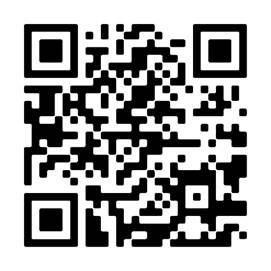
The exhibit serves as a continuation of the Queens Memory’s efforts to document the experiences of borough’s residents during the pandemic, which began in April 2020 as part of its COVID-19 Project.
About Queens Memory
Queens Memory is an ongoing community archiving program supported by Queens Public Library and Queens College, CUNY. We engage with Queens residents in our two-fold mission to (1) push local history collections out to the public through programming and online resources, and (2) pull new materials into our collections from the diverse communities of Queens. The goal is to raise awareness and a sense of ownership in the production of our shared historic record and our dream is that any Queens resident who visits these collections feels his/her experiences and perspective are represented. Queens Memory also provides training and materials for anyone wishing to contribute oral history interviews, photographs, or other records of his/her neighborhoods, families, and communities. These materials get a permanent home in the Archives and are shared back with the public on a variety of platforms including Aviary, Urban Archive, our podcast series, Instagram, and in the archival repositories of Queens Public Library and Queens College’s Rosenthal Library. Queens Memory was founded in 2010 and has been honored with the 2014 Archivists Round Table Award for Educational Use of Archives and the 2019 New York State Archives’ Debra E. Bernhardt Annual Archives Award for Excellence in Documenting New York’s History.
About Queens Public Library
Queens Public Library is one of the largest and busiest public library systems in the United States, dedicated to serving the most ethnically and culturally diverse area in the country. An independent, non-profit organization founded 125 years ago, QPL offers free access to a collection of more than 5 million books and other materials in multiple languages, technology and digital resources, and more than 80,000 educational, cultural, and civic programs annually. QPL consists of 66 locations across the borough, including branch libraries, a Central Library, seven adult learning centers, a technology center, and two teen centers, and attracted more than 11 million visitors in 2019.
FOR IMMEDIATE RELEASE
Thursday, February 24, 2022
Contact: Ewa Kern-Jedrychowska, ekern@queenslibrary.org
Queens Public Library Reopens Its Queensbridge Tech Lab Providing Digital Literacy Resources and Programs Essential for an Equitable Recovery from the COVID-19 Pandemic
Long Island City, NY – Queens Public Library today announced that it is reopening its Queensbridge Tech Lab, at 10-43 41st Avenue, on Saturday, March 5 at 10 AM.
The Queensbridge Tech Lab primarily serves the housing complex, which is owned and operated by the New York City Housing Authority. While the Lab puts a special emphasis on offering programming for the Queensbridge community, it provides learning opportunities to everyone.
As New York continues to recover from the impact of COVID-19, the Lab helps its customers, many of whom have been disproportionately affected by the pandemic, build critical skills needed to succeed in school and in the workplace by offering virtual and in-person workshops on a wide range of tech topics for all ages, including basic computer skills, audio and video editing, graphic design, 3D printing, robotics, web development, computer programming and technology job readiness.
A hub of innovation and technology in the community, the Lab also offers access to Maker Space programs, printing and scanning, as well as crafting supplies and sewing machines.
The space features five desktop computers and 20 laptops available for in-house use. In addition, the Lab provides a laptop and hotspot loan program.
Specialized software like Audacity, Adobe Creative Suite, QuickBooks Pro, and Scratch are available during open hours for self-guided learning and independent projects. The Lab also offers review sessions for customers seeking to earn Microsoft Office Specialist certifications.
“We are excited to welcome our customers back to the Queensbridge Tech Lab,” said Lakishia Brown, QPL’s Job and Business Academy Special Projects Coordinator, who oversees the Lab. “As New York seeks to re-emerge from the pandemic as a more equitable city, our customers, now more than ever, need access to programs helping them develop hands-on skills necessary to pursue tech-related degrees and sought-after tech careers.”
QPL’s Queensbridge location first opened in 1949, initially serving as a library branch and then a family literacy center, before becoming a Tech Lab.
Launched in 2017 with three-day service, the Lab is funded by the Mayor’s Office of the Chief Technology Officer (MOCTO) and supports MOCTO’s investment in digital inclusion at Queensbridge Houses by serving as a ground for new technology programming and facilitating access to the Internet as residents log on to the Queensbridge Connected wireless network.
In 2019, it expanded its services to four days a week, as demand for digital literacy programs continued to grow in the area. That year alone, the Lab provided roughly 3,000 NYCHA residents with hands-on access to hardware and software training and served more than 3,400 patrons during Open Lab hours.
The Lab closed in March 2020, when QPL temporarily closed its physical locations to help stop the spread of COVID-19. But it continued to serve the community throughout the pandemic with virtual workshops, focused on digital literacy and job readiness.
In addition to programming, customers can set up one-on-one appointments with the staff to learn or further improve their technology skills.
On the first Saturday of each month, the Lab hosts its Open House series, where customers can make mini-projects on a variety of Tech Lab tools and learn about its upcoming workshops.
In partnership with the Adult Literacy Center at the Long Island City Library, the Tech Lab also serves as a Literacy Zone, connecting individuals with limited literacy or English language skills with case management specialists, resources and services. Eligible out-of-school youth and adults can receive referrals to a variety of coordinated services and benefits.
Queensbridge Tech Lab Open Hours:
Monday, Wednesday, Thursday - 12-8pm
Saturday, 10am-5pm
Phone number: 718-937-6266
###
About Queens Public Library
Queens Public Library is one of the largest and busiest public library systems in the United States, dedicated to serving the most ethnically and culturally diverse area in the country. An independent, non-profit organization founded 125 years ago, QPL offers free access to a collection of more than 5 million books and other materials in multiple languages, technology and digital resources, and more than 80,000 educational, cultural, and civic programs annually. QPL consists of 66 locations across the borough, including branch libraries, a Central Library, seven adult learning centers, a technology center, and two teen centers, and attracted more than 11 million visitors in 2019
The recent occurrence of house fires in New York City is a reminder of the importance of fire safety rules, regulations and best habits. Often a potential disaster can be prevented by accessing the correct information and implementing good practices.
Here are some pro tips to prevent fires from occurring:
- Install smoke alarms on every level of your home, inside bedrooms and outside sleeping areas. Test them once a month and replace the batteries at least once a year.
- Teach children what smoke alarms sound like and what to do when they hear one.
- Keep space heaters at least 3 feet away from bedding, curtains, and other flammable materials, and always plug your heater directly into the wall. Learn more here.
- Ensure that all household members know two ways to escape from every room of your home and know the family meeting spot outside of your home.
- Establish a family emergency communications plan and ensure that all household members know who to contact if they can't find one another.
- Practice escaping from your home at least twice a year. Press the smoke alarm test button or yell “Fire“ to alert everyone that they must get out.
- Make sure everyone knows how to call 9-1-1.
- Teach household members to STOP, DROP and ROLL if their clothes should catch on fire.
- Always close the door when escaping a fire. Closing the door saves lives.
Frigid winter temperatures can be difficult to tolerate, and many families turn to space heaters for relief. In addition to keeping space heaters at least 3 feet away from any flammable materials, please make sure to:
- Avoid using electric space heaters in the bathroom or other areas where they may come in contact with water.
- Never use an extension cord with a space heater.
- Turn off/unplug the heater when you leave the room.
- Purchase a space heater with a thermostat and automatic shut-off, and make sure it includes the Underwriters Laboratories (UL) Mark.
Additionally, the use of kerosene or propane space heaters is illegal in New York City, and the use of these types of space heaters poses a high risk of injury or death.
Daylight Saving Time starts the weekend of March 12. The NYC Fire Department reminds you to be #FDNYSmart: when you change your clocks, change the batteries in your smoke/carbon monoxide (CO) alarm.
Find more #FDNYSmart tips on Twitter or visit fdnysmart.org.
For more resources in multiple languages, please click here.
Tags
Filing your taxes can be complex and confusing.
Join us and the New York State Department of Taxation and Finance on February 15 and March 15 at 6PM for virtual information sessions where you can learn about all the free options available for filing your federal and state tax returns.
Queens Public Library has also compiled a resource list of partner organizations who can provide you with virtual tax help this year.
Get our complete list of organizations here that can help you e-file your taxes for free. Contact them directly for more information about the services they provide.
You can also pick up a copy of our 2022 Tax Help Brochure at your local library, or download the brochure here.
Please note that Queens Public Library does not operate these programs, does not vouch for the accuracy of information disseminated during such programs, and assumes no responsibility for any statements made.
The following standard documents are required to prepare your taxes:
- Photo ID – driver license, state-issued non-driver ID, NYC ID or passport (for you and your spouse, if filing jointly)
- Social Security card for you, your spouse, and your dependents
- Proof of income (wages, interest and dividend statements): Forms W-2, 1099, 1098, and any other documents showing additional income
- Documents from the IRS: the amount of 2021 Stimulus payment and amount of Advanced Child Tax Credit (CTC) payments received between July and December (see IRS letter 6419)
- Forms 1095-A, B, or C, Affordable Healthcare Statement
- Information related to any credits you’re claiming
- Your banking information (the account number and the routing number for your bank, which you can find on a blank check)
FOR IMMEDIATE RELEASE
Sunday, January 30, 2022
CONTACT:
Ewa Kern-Jedrychowska, Queens Public Library, ekern@queenslibrary.org
QPL Reopens Its Far Rockaway Teen Library Offering Resources and Support for Teens Disproportionately Impacted by the Pandemic
The Space Will Offer Expanded Teen-Friendly Programming, Including Podcast Production, DJing Classes and App Development Workshops
(Far Rockaway, NY – January 30, 2022) Queens Public Library today announced that it is reopening its Far Rockaway Teen Library, at 2002 Cornaga Avenue, on Monday, January 31 at 2:30PM.
The center, originally established in 2008, is designed exclusively for teens, many of whom have been experiencing unprecedented isolation since the beginning of the pandemic. It provides teens in Far Rockaway with dedicated space they can call their own, helping them explore their interests and learn outside of the classroom with their peers and trusted adults. It closed in March 2020, when QPL temporarily closed its physical locations to help stop the spread of COVID-19.
The space will offer expanded teen-friendly programming, including a series of podcast production workshops and DJing classes, which will initially be offered virtually, until the Library resumes in-person programming. In the upcoming weeks, the Teen Library is also planning to launch an app development program.
The center has a dedicated homework space and computer area with free printing (up to 20 pages a day). It aims to stimulate creative thinking, encourage civic engagement and – with the guidance of youth counselors and teen librarians – helps teens explore their school and career options.
“Now more than ever, teens need an inclusive space where they can access a wealth of resources, feel comfortable and connect with other young people,” said Teen Center Site Coordinator, Eyitami Oyarijivbie. “We are very excited to welcome young people back to the Far Rockaway Teen Library and offer them a safe and inspiring environment.”
The Teen Library will continue to provide its robust virtual programming, including Youth Justice Court, workshops on subjects ranging from technology, entrepreneurship and financial literacy to creative arts and health and wellness, college readiness and job search resources, as well as a book club. It will also offer grab-and-go kits, containing items like craft supplies, bookmarks, and writing journals to engage teens in projects outside the Library.
Prior to the start of the pandemic, the Far Rockaway Teen Library served approximately 33,000 young adults a year.
The Far Rockaway Teen Library will be open Monday through Friday from 2:30 to 6 PM.
As the center welcomes teens back to the building, QPL continues to follow COVID-19 protocols to protect its staff and customers. Teens will need a library card to enter the space and reserve a time slot to use gaming systems and computers. Reservations can be made starting on Monday, January 31 at 12PM. To make a reservation, go here or scan the below QR code (QR code will also be placed in library windows). Reservations can be made a week in advance for up to 45 minutes per activity. Walk-in reservations can be made at the main desk if slots are available.
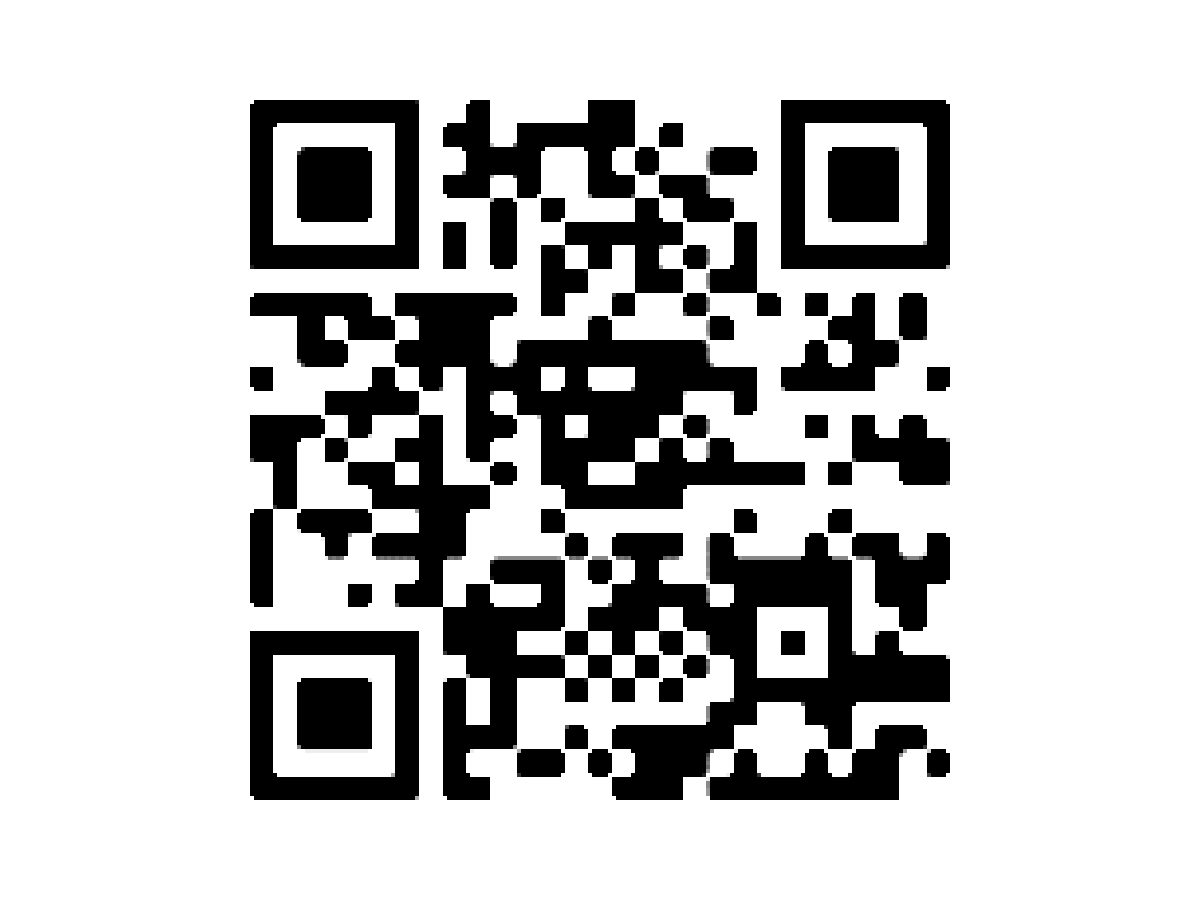
The Far Rockaway Teen Library is adjacent to the Far Rockaway Swing Space, located at 1003 Beach 20th Street. The main Far Rockaway Library at 1637 Central Ave. is closed during the construction of a new building, tentatively expected to open to the public by the end of the year.
###
About Queens Public Library
Queens Public Library is one of the largest and busiest public library systems in the United States, dedicated to serving the most ethnically and culturally diverse area in the country. An independent, non-profit organization founded 125 years ago, QPL offers free access to a collection of more than 5 million books and other materials in multiple languages, technology and digital resources, and more than 80,000 educational, cultural, and civic programs annually. QPL consists of 66 locations across the borough, including branch libraries, a Central Library, seven adult learning centers, a technology center, and two teen centers, and attracted more than 11 million visitors in 2019.
Steinway Library’s main entrance on 31st Street features a new ADA accessible ramped entrance and a 24/7 exterior book returns machine.
FOR IMMEDIATE RELEASE
Tuesday, January 18, 2022
CONTACT:
Shoshana Khan, NYC Department of Design and Construction, KhanSho@ddc.nyc.gov
Ewa Kern-Jedrychowska, Queens Public Library, ekern@queenslibrary.org
Queens Public Library and NYC Department of Design and Construction Announce the Reopening of Steinway Library Following Accessibility, Rehabilitation and Improvements Project
$4.9 Million Project Adds Accessible Entrance, Elevator and Upgrades the Interior
(Astoria, NY – January 18, 2022) Queens Public Library (QPL) and the NYC Department of Design and Construction (DDC) today announced the reopening of Steinway Library at 21-45 31st Street in Astoria, following a $4.9 million project to improve the library’s accessibility for persons with disabilities and upgrade the interior. DDC managed the project for QPL.
“These crucial upgrades to the building offer the community a library that is more inviting, technologically efficient and accessible to all,” said Queens Public Library President and CEO Dennis M. Walcott. “We know the public has been eagerly awaiting the reopening of the branch, and we are truly excited to welcome and serve them once again.”
“The renovations at Steinway Library improve and update a vital community resource for Astoria; a new elevator also opens the library to more New Yorkers, including persons with disabilities,” said NYC Department of Design and Construction Acting Commissioner Thomas Foley. “This project is an example of the great work we are able to perform on behalf of Queens Public Library to create and enhance educational spaces for communities throughout Queens.”
“The historic Steinway Library has been a critical anchor of this community for the generations of families who have passed through its doors. With this multimillion dollar renovation effort complete, all Astoria families, regardless of ability, finally have equitable access to the educational and enrichment opportunities this library provides,” said Queens Borough President Donovan Richards Jr. “Thank you to the Queens Public Library and the NYC Department of Design and Construction for making this project a reality and providing the readers and residents of Astoria with a state-of-the-art facility to learn and grow — they deserve nothing less.”
“Public libraries show us what we can build when we invest in public infrastructure for all New Yorkers,” said Assembly Member Zohran K. Mamdani. “Congrats to QPL as they reopen our Steinway public library with improvements that make it more accessible for all of our neighbors. I can’t wait for my next visit!”
“I am delighted to celebrate the reopening of the Steinway Library,” said NYC Council Member Tiffany Cabán. “Since I was sworn in, my office has heard a great deal from the community about what a vital resource it is. Thank you to the Queens Public Library for all the resources they’ve devoted to make our library more functional, accessible, and inviting. I’ll see you there on Tuesday!”
“I grew up reading with my parents, doing my homework and research at the Steinway Library. It was a great privilege as a Councilmember to support the renovations of ADA upgrades including an elevator and entrances, a renovated children's floor and upgrades to the overall building,” said Costa Constantinides, former NYC Council Member and current CEO Variety Boys and Girls Club of Queens. “This work ensures that families in our community can rely on this library into the future and continue to make this our community space. Thank you to Dennis Walcott, QPL and all involved for bringing these renovations to fruition.”
Steinway Library is one of the three original branches that 125 years ago had become part of the Long Island City Public Library system, which was later renamed to Queens Borough Public Library. The current building, designed by architect Adolph Goldberg in a mid-century modern style, opened in 1956. The 12,500-square-foot structure includes a cellar and two above-grade levels on a 7,600-square-foot lot with a landscaped rear garden.
The completion of the project brings a new elevator providing access to all three levels of the building from the cellar to the second floor. A new ADA accessible ramped entrance and a 24/7 exterior book returns machine were installed at the library’s main entrance on 31st Street. Three new restrooms were installed in the cellar, including an all gender, single-occupant, ADA accessible restroom.
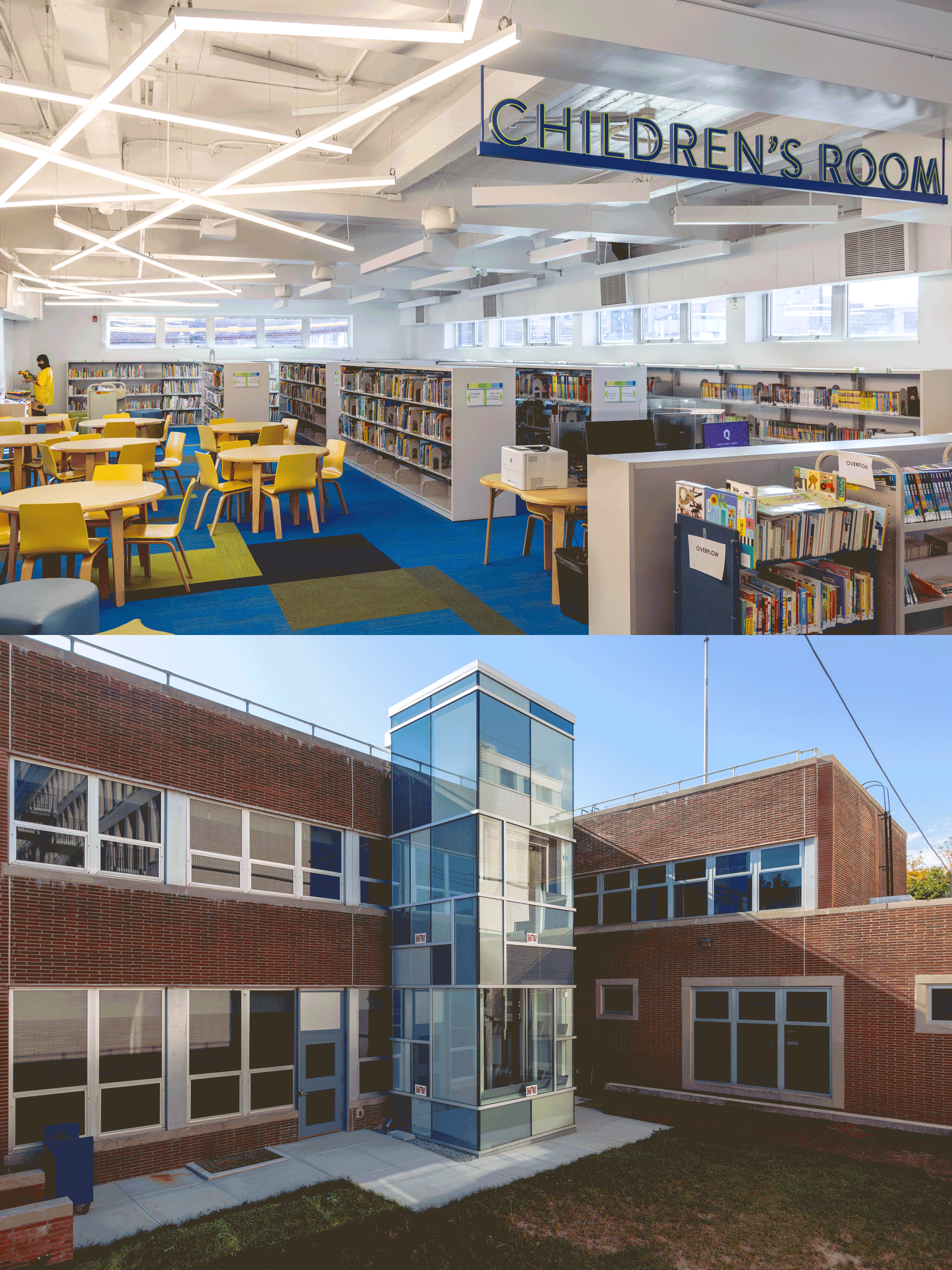
TOP: The renovated children’s and teen areas feature new ceilings, flooring, furniture and lighting.
BOTTOM: A new elevator shaft sits at the exterior of the library with translucent glass panels to provide diffused light and views into the courtyard.
The second-floor children’s area, teen area, and multi-purpose room as well as part of the cellar of the library were renovated with new ceilings, flooring, furniture and lighting. New staff and managers offices were constructed in the cellar. The library’s safety was improved with the installation of a new security system. An audio-visual system was installed to facilitate interactive learning and WiFi capability was expanded throughout the building.
To preserve the interior space of the library, the elevator shaft was constructed in the building’s rear garden featuring an aluminum framed curtain wall enclosure made up of translucent glass panels to provide diffused light and views into the courtyard.
The exterior of the library was preserved with the repointing of some of the deteriorated brickwork and the installation of some new window beams. A new roofing membrane was installed to ensure structural integrity of the building. Insulated glazing was used at the new entrance and elevator enclosure to increase energy efficiency.
The project was designed by Huff + Gooden Architects under DDC’s Design and Construction Excellence 2.0 program, which pre-selects and pre-qualifies design firms that DDC works with on projects with construction budgets of up to $50 million. The program is designed to decrease the amount of time required for DDC to procure design services, while ensuring the highest levels of quality and professionalism in construction projects managed by the agency. Construction was carried out by XBR, Inc., a local contractor in Astoria.
Prior to the start of the pandemic, Steinway Library served nearly 200,000 customers and circulated more than 225,000 materials a year.
QPL is in the process of planning additional upgrades to portions of the main floor and cellar as well as a replacement of the HVAC system.
Funding for this project was provided by former Mayor Bill de Blasio, former Queens Borough President Melinda Katz, former Assembly Member Aravella Simotas and former Council Member Costa Costantinides. Queens Public Library and the NYC Department of Design and Construction are thankful to them, as well as to Mayor Eric Adams, Queens Borough President Donovan Richards, Assembly Member Zohran Mamdani and Council Member Tiffany Caban for their support of this project.
# # #
About Queens Public Library
Queens Public Library is one of the largest and busiest public library systems in the United States, dedicated to serving the most ethnically and culturally diverse area in the country. An independent, non-profit organization founded 125 years ago, QPL offers free access to a collection of more than 5 million books and other materials in multiple languages, technology and digital resources, and more than 80,000 educational, cultural, and civic programs annually. QPL consists of 66 locations across the borough, including branch libraries, a Central Library, seven adult learning centers, a technology center, and two teen centers, and attracted more than 11 million visitors in 2019.
About the NYC Department of Design and Construction
The Department of Design and Construction is the City’s primary capital construction project manager. In supporting Mayor de Blasio’s long-term vision of growth, sustainability, resiliency, equity and healthy living, DDC provides communities with new or renovated public buildings such as firehouses, libraries, police precincts, and new or upgraded roads, sewers and water mains in all five boroughs. To manage this $15.5 billion portfolio, DDC partners with other City agencies, architects and consultants, whose experience bring efficient, innovative and environmentally-conscious design and construction strategies to City projects. For more information, please visit nyc.gov/ddc.
We hope you will join us for our special virtual events that pay tribute to the life and legacy of Martin Luther King, Jr.
We also have suggestions below for great books and movies about Dr. King, and a special surprise from our Queens Memory team!
All Queens Public Library locations will be closed on Monday, January 17 for the Martin Luther King, Jr. holiday.
Queens Memory: Martin Luther King, Jr. at Queens College
Book Picks for Teens and Adults
NEW: Queens Memory: Martin Luther King, Jr. at Queens College
A new addition to the QPL archives! Listen to audio clips from the inaugural John F. Kennedy Lecture Series speech given by Martin Luther King, Jr. on May 13, 1965, at Queens College, City University of New York.
Special Events
NEW: Ralph McDaniels’ All Vinyl 45s Hip Hop and Soul Brunch (January 15)
Watch the replay of the MLK Weekend edition of QPL Hip Hop Coordinator Ralph McDaniels' Instagram Live DJ set.
***
NEW: Martin Luther King, Jr. Celebration: Freedom Fighters (January 15)
Watch the replay of this dramatic performance.
***
NEW: Culture Connection: A Martin Luther King, Jr. Celebration in Words and Music with Charles Duke (January 14)
Watch the replay of this concert.
***
Martin Luther King, Jr. Commemorative Brochure
Pick up this special brochure at Mitchell-Linden Library (31-32 Union Street in Flushing) featuring suggested activities that you can do to honor Martin Luther King, Jr.’s legacy.
***
Dr. Martin Luther King Scavenger Hunt
Tuesday, January 11 through Friday, January 21
Join us for this trivia scavenger hunt at Richmond Hill Library (118-14 Hillside Avenue).
***
Film Screening: "Turning 15 on the Road to Freedom"
Wednesday, January 12, 7pm
This musical drama is based on the award-winning memoir by Lynda Blackmon Lowery, which tells her inspiring, true story as the youngest person to walk all the way from Selma to Montgomery, Alabama in the Voting Rights March in 1965. Learn More & Join Us
***
MLK Collaborative Poster
Thursday, January 13 and Friday, January 14
Help us create this poster at Richmond Hill Library (118-14 Hillside Avenue).
***
Grab and Go MLK Jr. Activities for Families
Thursday, January 13 and Friday, January 14, 2:30pm
You can pick up these grab-and-go kits at Cambria Heights Library (218-13 Linden Boulevard).
***
“I Have a Dream” Activity
Thursday, January 13, 4:30pm
Join us for this activity at Richmond Hill Library (118-14 Hillside Avenue).
***
Martin Luther King Jr. Book Club: “Where Do We Go from Here: Chaos or Community?”
Friday, January 14, 11am
Join Cambria Heights Library for this virtual book discussion.
***
Culture Connection: A Martin Luther King, Jr. Celebration in Words and Music with Charles Duke
Friday, January 14, 7pm
Award-winning singer-songwriter and composer Charles Duke will explore the impact and legacy of Dr. Martin Luther King, Jr. through storytelling and song. Watch live on our Facebook page.
***
Martin Luther King, Jr. Celebration: Freedom Fighters
Saturday, January 15, 12pm
The East Harlem Repertory Theater will present their “Freedom Fighters” dramatic performance in honor of Martin Luther King, Jr. Watch live on our Facebook page.
***
What is Your Dream? Post-it Wall
Tuesday, January 18
"So even though we face the difficulties of today and tomorrow, I still have a dream." What is your dream for a better future? Share it with Cambria Heights Library (218-13 Linden Boulevard) all day long on their Post-it wall.
***
When Art Speaks: Louis Armstrong and Civil Rights
Wednesday, January 19, 7pm
During his lifetime, Louis Armstrong was lauded as a brilliant trumpeter and vocalist, but behind his smiling "Satchmo" stage persona, he was also a major civil rights pioneer. In this multimedia presentation, Ricky Riccardi, Director of Research Collections for the Louis Armstrong House Museum, will share rare images, audio and video to explain how Armstrong broke down barriers for his race throughout his career, including putting his career on the line to speak out against injustice during the Little Rock school integration crisis in 1957. Learn More & Join Us
***
Celebrating Martin Luther King Jr. Day: Bilingual Stories in English & Chinese 中英文故事會:馬丁路德金的故事
Friday, January 21, 3:30pm
In this program for children ages 5 and under, Ms. Janice, the early learning assistant at Flushing Library, will tell stories about Martin Luther King, Jr. and his famous speech “I Have a Dream,” and discuss other leaders of the Civil Rights Movement like Rosa Parks. Learn More & Join Us
***
When Art Speaks: Shades of Truth Theatre presents “Different Kind of King”
Wednesday, January 26, 7pm
We pay tribute to the young Dr. King who burst onto the scene as the leader of the successful 1955 Montgomery, Alabama bus boycott, the first king. His voice stirred a nation to action in his “I Have a Dream” speech at the 1963 March on Washington, the second king. Then the King who believed we had integrated into a burning building and boldly denounced the Vietnam War on April 4, 1967 and was assassinated one year later on April 4, 1968, the last king! Register & Join Us
OverDrive eBooks
Check out our list of eBooks for kids, teens, and adults about Dr. King on OverDrive.

Book Picks for Kids
I Have a Dream by Martin Luther King, Jr. (foreword by Coretta Scott King; paintings by fifteen Coretta Scott King Award and Honor Book artists)
I Have a Dream by Martin Luther King, Jr. (illustrated by Kadir Nelson)
The Words of Martin Luther King, Jr. (selected by Coretta Scott King)
A Picture Book of Martin Luther King, Jr. by David A. Adler and Robert Casilla
My First Biography: Martin Luther King, Jr. by Marion Dane Bauer and Jamie Smith
Martin Luther King, Jr.: Voice for Equality! by James Buckley, Jr. and Youneek Studios
Free at Last! by Angela Bull
The Cart that Carried Martin by Eve Bunting and Don Tate
Martin Luther King: the Peaceful Warrior by Ed Clayton and Donald Bermudez
Child of the Civil Rights Movement by Raúl Colón and Paula Yong Shelton
Memphis, Martin, and the Mountaintop: The Sanitation Strike of 1968 by Alice Faye Duncan and R. Gregory Christie
We March by Shane W. Evans
My Brother Martin by Christine King Farris and Chris Soentpiet
March On! The Day My Brother Martin Changed the World by Christine King Farris and London Ladd
Martin Luther King, Jr. by Josh Gregory
Martin Luther King, Jr.: Civil Rights Leader by Grace Hansen
Martin Luther King, Jr. Day by Lisa M. Herrington
Martin Luther King, Jr. by Kitson Jazynka
Who Was Martin Luther King, Jr.?: A Who Was? Board Book by Lisbeth Kaiser and Stanley Chow
My Daddy, Dr. Martin Luther King, Jr. by Martin Luther King III and AG Ford
1963 March on Washington (Protest! March for Change) by Joyce Markovicks
Happy Birthday, Martin Luther King by Jean Marzollo and Brian J. Pinkney
Martin Luther King, Jr. National Memorial: A Stone of Hope by Joanne Mattern
I Am Brave: A Little Book about Martin Luther King, Jr. by Brad Meltzer and Chris Eliopoulos
I Am Martin Luther King, Jr. by Brad Meltzer and Chris Eliopoulos
The Story of Martin Luther King, Jr. by Johnny Ray Moore and Amy Wummer
Dream March: Dr. Martin Luther King, Jr., and the March on Washington by Vaunda Micheaux Nelson and Sally Wern Comport
The Life and Words of Martin Luther King, Jr. by Ira Peck
Martin Rising: Requiem for a King by Andrea Davis Pinkney and Brian Pinkney
Martin Luther King, Jr.: Fighting for Civil Rights by Christine Platt & David Shepard
Martin's Big Words by Doreen Rappaport and Bryan Collier
Martin Luther King, Jr. by Lucia Raatma
Martin Luther King...and the Fight for Equality by Sarah Ridley
Be a King: Dr. Martin Luther King, Jr.'s Dream and You by Carole Boston Weatherford and James Ransome
A Place to Land: Martin Luther King, Jr. and the Speech That Inspired a Nation by Barry Wittenstein and Jerry Pinkney
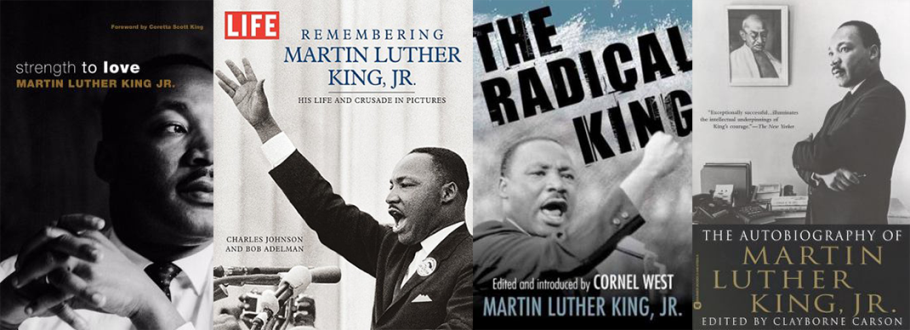
Book Picks for Teens and Adults
I Have a Dream by Martin Luther King, Jr.
I Have a Dream and Letter from Birmingham Jail by Martin Luther King, Jr.
Strength to Love by Martin Luther King, Jr.
Stride Toward Freedom by Martin Luther King, Jr.
The Trumpet of Conscience by Martin Luther King, Jr.
Where Do We Go From Here: Chaos or Community? by Martin Luther King, Jr.
Why We Can't Wait by Martin Luther King, Jr.
The Martin Luther King, Jr. Companion (selected by Coretta Scott King)
The Papers of Martin Luther King, Jr.
The Words of Martin Luther King, Jr. (selected by Coretta Scott King)
The Autobiography of Martin Luther King, Jr. (edited by Clayborne Carson)
The Autobiography of Martin Luther King, Jr. (edited by Clayborne Carson) (CD Audiobook)
A Knock at Midnight: Inspiration from the Great Sermons of Reverend Martin Luther King, Jr. (edited by Clayborne Carson and Peter Holloran)
A Knock at Midnight: Inspiration from the Great Sermons of Reverend Martin Luther King, Jr. (edited by Clayborne Carson and Peter Holloran) (CD Audiobook)
A Call to Conscience: The Landmark Speeches of Dr. Martin Luther King, Jr. (edited by Clayborne Carson and Kris Shepard)
A Time to Break Silence: The Essential Works of Martin Luther King, Jr. for Students (introduction by Walter Dean Myers)
A Testament of Hope: The Essential Writings and Speeches (edited by James Melvin Washington)
I Have a Dream: Writings and Speeches That Changed the World (edited by James Melvin Washington)
The Radical King (edited by Cornel West)
My Life, My Love, My Legacy by Coretta Scott King and Barbara Reynolds
My Life, My Love, My Legacy by Coretta Scott King and Barbara Reynolds (CD Audiobook)
The Assassination of Martin Luther King, Jr. (Perspectives on Modern World History) by Noah Berlatsky
The Assassination of Martin Luther King, Jr. by Valerie Bodden
The King Years by Taylor Branch
Burial for a King by Rebecca Burns
The Martin Luther King, Jr. Encyclopedia by Clayborne Carson
Waking from the Dream by David L. Chappell
Waking from the Dream by David L. Chappell (eBook)
The Assassination of Martin Luther King, Jr. by Jacqueline Ching
April 4, 1968 by Michael Eric Dyson
April 4, 1968 by Michael Eric Dyson (CD Audiobook)
I See the Promised Land by Arthur Flowers and Manu Chitrakar
Martin Luther King, Jr.: A Life by Marshall Frady
An American Death by Gerold Frank
The Life and Death of Martin Luther King, Jr. by James Haskins
Becoming King by Troy Jackson
Life Magazine: Remembering Martin Luther King, Jr. by Charles Johnson and Bob Adelman
My Time with the Kings by Kathryn Johnson
The Sword and the Shield: The Revolutionary Lives of Malcolm X and Martin Luther King, Jr. by Peniel E. Joseph
Nine Days: The Race to Save Martin Luther King, Jr.’s Life and Win the 1960 Election by Stephen Kendrick & Paul Kendrick
Kennedy and King by Steven Levingston
March: Book One, Book Two, and Book Three by John Lewis, Andrew Aydin, and Nate Powell
Martin Luther King, Jr. (Routledge Historical Biographies) by Peter J. Ling
Turning 15 on the Road to Freedom: My Story of the 1965 Selma Voting Rights March by Lynda Blackmon Lowery
The Murkin Conspiracy by Philip H. Melanson
Orders to Kill by William F. Pepper
Killing the Dream by Gerald Posner
Who Killed Martin Luther King? by James Earl Ray
Gospel of Freedom: Martin Luther King, Jr.’s Letter from Birmingham Jail and the Struggle That Changed a Nation by Jonathan Rieder
Redemption: Martin Luther King, Jr.'s Last 31 Hours by Joseph Rosenbloom
Hellhound on His Trail by Hampton Sides
Hellhound on His Trail by Hampton Sides (CD Audiobook)
King: Pilgrimage to the Mountaintop by Harvard Sitkoff
Death of a King: The Real Story of Dr. Martin Luther King, Jr.'s Final Year by Tavis Smiley
Death of a King: The Real Story of Dr. Martin Luther King, Jr.'s Final Year by Tavis Smiley (eBook)
Chasing King's Killer by James L. Swanson
Martin Luther King, Jr.: Let Freedom Ring by Michael Teitelbaum and Lewis Helfand
Martin Luther King, Jr.: A King Family Tribute by Angela Farris Watkins and Andrew Young
Killing King: Racial Terrorists, James Earl Ray, and the Plot to Assassinate Martin Luther King Jr. by Stuart Wexler and Larry Hancock
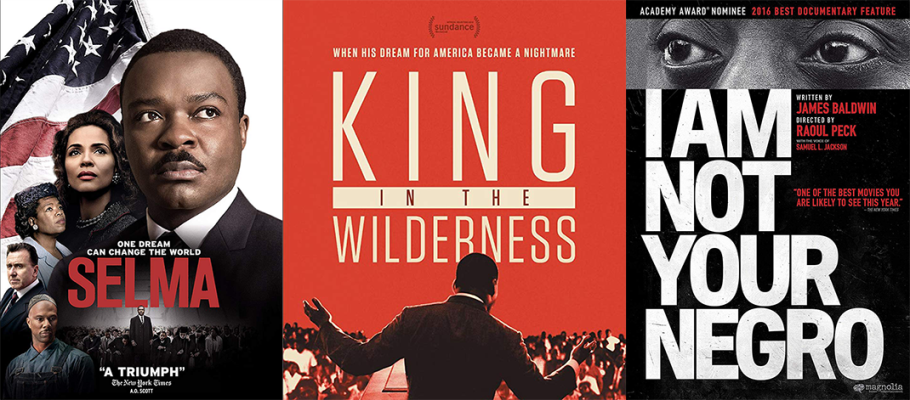
Movie Picks
4 Little Girls (1997)
All The Way (2016)
Been to the Mountaintop (2006)
Betty & Coretta (2013)
Boycott (2001, PG)
The Cart that Carried Martin (2013)
Dr. Martin Luther King, Jr.: A Historical Perspective (1994)
Freedom on My Mind (1994)
History Kids: Martin Luther King, Jr. (2018)
I Am Not Your Negro (2016, PG-13)
In Remembrance of Martin (1986)
King (1978)
King: Man of Peace in a Time of War (2007)
Lee Daniels' The Butler (2013, PG-13)
King: A Filmed Record... Montgomery to Memphis (1970)
King in the Wilderness (2018)
The March (2013, TV-PG)
March On! The Day My Brother Martin Changed the World (2008)
Martin's Big Words (2005)
Men of Peace: Gandhi, Martin Luther King, Jr., Nelson Mandela (2009)
Our Friend, Martin (1998)
Roads to Memphis (2010, TV-PG)
Selma (2014, PG-13)
Selma, Lord, Selma (1999, PG)
We Shall Overcome (2009)
UPDATE (12/28): All QPL locations will be closing at 5PM on Thursday, December 30.
Here is the Library's holiday schedule for the end of December 2021.
All Queens Public Library locations will be closed on Friday, December 24; on Christmas Day, Saturday, December 25; and on Sunday, December 26. QPL's telephone reference and Chat with a Librarian services will also be unavailable.
All QPL locations will be closing at 5PM on Thursday, December 30; closed on Friday, December 31; closed on New Year’s Day, Saturday, January 1, 2022; and closed on Sunday, January 2, 2022. QPL's telephone reference and Chat with a Librarian services will also be unavailable.
Our digital media is always available from anywhere with an Internet connection — enjoy eBooks, eMagazines, music, movies, and more.
We wish you happy holidays and look forward to seeing you in 2022!
FOR IMMEDIATE RELEASE
Tuesday, December 14, 2021
CONTACT:
Ewa Kern-Jedrychowska, Queens Public Library, ekern@queenslibrary.org, 917-702-0016
Queens Public Library, Elected Officials and Community Leaders Mark the Start of a Project to Renovate and Modernize Bay Terrace Branch
$5.7 Million Overhaul Will Add A New Multipurpose Room And A Designated Teen Area
(Bayside, NY – December 14, 2021)
Queens Public Library President and CEO Dennis M. Walcott today held a groundbreaking ceremony to celebrate the beginning of a $5.7 million project to renovate and modernize Bay Terrace Library. He was joined by Queens Borough President Donovan Richards, State Senator John Liu, Assemblyman Edward Braunstein, Council Member Paul Vallone, community leaders and library staff.
The two-year project, expected to begin as early as March 2022, includes the expansion of the main entrance at 18-36 Bell Blvd. and improvements to the exterior garden area. In addition, the project calls for a full interior renovation, featuring updated furniture and technology to facilitate interactive learning. The building will also house a new designated teen area and a new state-of-the-art multipurpose community room with audiovisual equipment and access from the 23rd Avenue side entrance with a new ADA compliant ramp. A new HVAC system and energy-efficient roof will be also installed.
“With these renovations, the Bay Terrace branch will be more welcoming, inspiring and technologically efficient, and will reinforce its role as the center of community life,” said Queens Public Library President and CEO Dennis M. Walcott. “I want to thank Council Member Paul Vallone for his advocacy and financial support for libraries in his district and beyond, and Mayor Bill de Blasio, Queens Borough President Donovan Richards and State Senator John Liu for securing the funds to modernize the Bay Terrace branch, helping ensure Queens Public Library can continue to provide free access to information, knowledge and opportunity for all.”
“The Bay Terrace community will finally have the first-class library they deserve, meeting and exceeding the educational, cultural, and occupational needs for decades to come,” said Queens Borough President Donovan Richards Jr. “I am proud to have allocated capital funding for these critically necessary renovations and look forward to celebrating the completion of this work. Many thanks to Dennis Walcott and his great team at Queens Public Library for their work to enhance this branch’s service and programming they will provide to Bay Terrace residents.”
“Our libraries are essential to the lifeblood of a healthy community. This is where our children can go to discover Where the Wild Things Are, or find inspiration in the Little Engine that Could. The modernization of the Bay Terrace Library will provide even more opportunities for learners both young and old with new technology, reimagined spaces, and upgraded infrastructure,” said State Senator John Liu. “My office proudly contributed funding for this exciting project to ensure Bay Terrace will have a first-class library for generations to come. Looking forward to the grand opening!”
“Our Queens Public Libraries are treasured community centers, and the state-of-the-art improvements at the Bay Terrace Library will be enjoyed by local families for generations to come,” said Assemblyman Edward Braunstein. “I thank Queens Borough President Richards, Senator Liu and Councilman Vallone for helping to make this project a reality for the Bay Terrace community.”
“Bay Terrace deserves a state of the art library for all who use its services. A full modern renovation with upgraded technology and space for local teenagers will allow more residents to experience the wonderful programs the Queens Public Library has to offer,” said Council Member Paul Vallone. “I am glad to have funded this in partnership with so many of my colleagues in government who all realize the importance of libraries to our communities.”
The one story 7,500-square-foot structure was completed in 1981. Prior to the start of the pandemic, Bay Terrace Library served nearly 75,000 customers and circulated approximately 90,000 items a year. The branch reopened on July 12, 2021, after QPL temporarily closed the Library’s physical locations in March 2020 to help combat the spread of COVID-19. More than 15,000 customers have visited the branch since it reopened, borrowing more than 16,000 items.
Funding for this project was provided by Mayor Bill de Blasio, Queens Borough President Donovan Richards, State Senator John Liu and Council Member Paul Vallone.
# # #
About Queens Public Library
Queens Public Library is one of the largest and busiest public library systems in the United States, dedicated to serving the most ethnically and culturally diverse area in the country. An independent, non-profit organization founded 125 years ago, QPL offers free access to a collection of more than 5 million books and other materials in multiple languages, technology and digital resources, and more than 80,000 educational, cultural, and civic programs annually. QPL consists of 66 locations across the borough, including branch libraries, a Central Library, seven adult learning centers, a technology center, and two teen centers, and attracted more than 11 million visitors in 2019.
